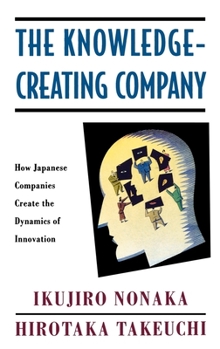The Knowledge-Creating Company: How Japanese Companies Create the Dynamics of Innovation
Select Format
Select Condition 
Book Overview
How have Japanese companies become world leaders in the automotive and electronics industries, among others? What is the secret of their success? Two leading Japanese business experts, Ikujiro Nonaka and Hirotaka Takeuchi, are the first to tie the success of Japanese companies to their ability to create new knowledge and use it to produce successful products and technologies. In The Knowledge-Creating Company, Nonaka and Takeuchi provide an inside...
Format:Hardcover
Language:English
ISBN:0195092694
ISBN13:9780195092691
Release Date:May 1995
Publisher:Oxford University Press, USA
Length:304 Pages
Weight:1.40 lbs.
Dimensions:1.1" x 9.3" x 6.4"
Customer Reviews
5 ratings
BEWARE! Digital version is only a 10 page summary!
Published by Thriftbooks.com User , 20 years ago
Don't get caught like I did.
An essential book on knowledge management
Published by Thriftbooks.com User , 22 years ago
This is perhaps one of the most important books presently available on knowledge management. The authors demonstrate how 'knowledge' is vital to innovation within Japanese firms, with clear distinction made between 'tacit' and explicit' knowledge. An effort is made to distinguish the differences between Japanese and Western firms through an emphasis on the importance of 'tacit' knowledge and a 'middle-up-down' management process. Other than Chapter 2 (a review of philosophical background relating to epistemology which might put some readers off), this book has minimal jargons and complexities and would be an easy and enjoyable read even for non-academics. The arguments presented by the authors are well-illustrated with relevant industrial examples. Overall, this is a book that not only brings a new perspective to knowledge management but also raises questions for the ardent researchers who might ponder over its relevance to non-Japanese firms.
Japanese Context...Global Relevance
Published by Thriftbooks.com User , 23 years ago
There are already so many excellent books now available on this subject. What sets this one apart is suggested by its subtitle: "How Japanese Companies Create the Dynamics of Innovation." Decades ago, Japanese executives embraced and acted upon Deming's ideas about TQM. Only after many years later was Deming properly appreciated by corporate leaders in the United States. The same cannot be said about knowledge management (KM) and its most prominent advocates in the United States, such as Peter Senge. Nonetheless, there is much of value we can learn about KM from the Japanese.According to the authors, "the success of Japanese companies is not due to their manufacturing process; access to cheap capital; close and cooperative relationships with customers, suppliers, and government agencies; or lifetime employment, seniority system, and other human resources management practices....Instead, we make the claim that Japanese companies have been successful because of their skills and expertise at `organizational knowledge creation'. By organizational knowledge creation, we mean the capability of a company as a whole to create new knowledge, disseminate it throughout the organization, and embody it in products, services, and systems."The material is carefully organized and developed within eight chapters:1. Introduction to Knowedge in organizations2. Knowledge and Management3. Theory of Organizational Knowledge Creation4. Creating Knowledge in Practice5. Middle-up-down Management Practice6. A New Organizational Structure7. Global Organizational Knowledge Creation8. Managerial and Theoretical ImplicationsThe chapters which I found most thought-provoking are 1, 3, and 8 but all are valuable. I agree with the authors that innovation can be (and is) achieved "by continuously creating new knowledge, disseminating it widely through the organization, and embodying it quickly in new technologies, products, and systems." I further agree that knowledge-creation "is no longer an enigma. ..[nor is the] process endemic to Japanese companies. It is universal." Leaders of any organization (regardless of its size, nature, or national identity) can derive great benefit from this book, one whose primary models and benchmarks may be limited to companies in only one country but whose relevance is indeed "universal."
Brilliant. Takes project management all the way.
Published by Thriftbooks.com User , 24 years ago
The book explores the eastern and western views of knowledge and how it is formed.It provides significant insights into how organisations can manage and accumulate knowledge.It goes way beyond Senge (The fifth Discipline) but includes Satre, Aristotle and others. It ties in with Peter Checklands Information, Systems and Information Systems in a way that provides a useful guide to anyone challenged by organisational change,or involved in project or program management.Solid Theory. Inspired case studies. Overall one of the best investments I ever made.
A must read for anyone who wants to go 'Global'
Published by Thriftbooks.com User , 26 years ago
'Knowledge!' - was my inspiration after reading this book. This book, by far, is one of the best books ever written on the hot topic of Japan-US. The authors seem to contend that 'Knowledge' is created through the synergy of divergent IDEAS or cultures. Not necessarily from just identifying, respecting, or fearing different ideas. This book goes beyond the realm of business, and is applicable to your everyday life as some of us are destined to bridge the gap between two or more cultures. It teaches that it's ok to be both American and Japanese, and the most important issue is - to become the best of both worlds and to educate and inspire others to do so. Shogo Richard Tsuru President, Founder Acto.org




